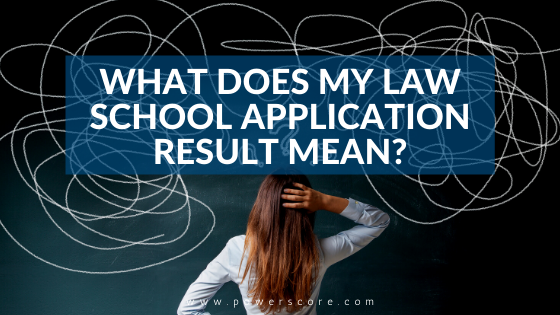During law school application decision time, letters, emails, and phone calls are sent out of admissions offices around the nation, letting applicants know of their fate. Of course, everyone knows what the big fat envelope and “Congratulations!” email means. They require no explanation. Although the most desirable application result is certainly that of an admission, that is not always what you may see.
It is important to be familiar with the other application results you might receive. That way you’ll know what to do after you receive a notification.
Waitlisting
We’ve talked about waitlisting before. Being waitlisted to a program means that you may be admitted to a program should someone that has been accepted choose not to come. Getting off a waitlist is unlikely. All schools know that a certain percentage of their admitted students will choose to go elsewhere and make up for it by admitting a larger number of applicants.
Waitlist applicants typically do not get off the waitlist until very late in the admissions cycle, which severely limits their choices. Because of this, if you’re on the waitlist, your need to communicate your desire to attend the school that waitlisted you in no uncertain terms.
So what should you do?
- Send a letter of continued interest (LOCI). In this letter, you should express your enthusiasm and desire to attend the school. Make sure to emphasize why you feel you would be a valuable asset to the law school’s program. You should send this immediately upon notification of wait list status.
- Send notification when anything substantial occurs to change your file. Notice of new grades, prizes, scholarships, jobs, or fellowships are always good to communicate.
- Keep in contact. A number of admitted applicants that say they will go to a certain school will withdraw their intent to enroll at some point during the summer. This is why it is important to keep in touch with the school throughout the summer months. You may be able to take advantage of these vacated spots if they keep in regular contact with the school (since the school will know you’re still interested and available).
- Do not turn into “that applicant.” Occasional brief communiqués with useful information and expressions of interest are good. Weekly emails and phone calls are not.
Holds
An administrative hold means that the school was unable to make a decision on your candidacy within the typical four to eight weeks, so your application will be held over until a later (often, significantly later) date. This suggests that your candidacy is strong. But, the school will not know if it’s strong enough until they’ve seen a greater percentage of the applicant pool.
If you are “held,” you should take the opportunity to send a short note reaffirming your interest in the program. If you have strong new information available—like a promotion or a published thesis—by all means, communicate it!
Note: This should not be confused with the “Held” or “Hold” option during the Early Decision or Early Application process. “Held” simply means that your file is being moved to the Regular Decision applicant pool.
Denials and Appeals
If you have been denied admission to a particular school, it is sometimes—rarely—advisable to appeal the decision. Do this only if substantially new–and dramatically positive–information about you has surfaced. Dramatically positive means more than just a higher LSAT score, a promotion, or a published thesis. It is typically something of a considerable nature that should also be highly uncommon among applicants. For example, you win a considerable academic grant or receive a nationally-recognized prize or fellowship.
Some schools have an appeal process in place; if you are interested in pursuing this route, you should contact the Admissions Office of the school directly and ask for guidance regarding the process. However, not all schools have an appeals process in place, and those that do may have some very strict requirements for it.
Not receiving immediate admission is not great, but it’s not the end of the world. Being familiar with the other admissions possibilities, and what you may be able to do about them, is empowering. You may not be able to change the decision, but you will still be armed with the knowledge necessary to give yourself the best shot.


Leave a Reply